高中英语必修五-unit 1 课文详解
- 格式:doc
- 大小:262.00 KB
- 文档页数:10
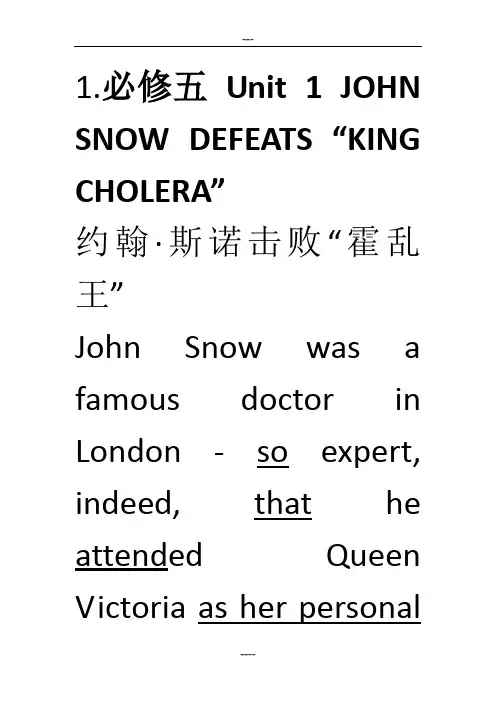
1.必修五Unit 1 JOHN SNOW DEFEATS “KING CHOLERA”约翰·斯诺击败“霍乱王”John Snow was a famous doctor in London - so expert, indeed, that he attended Queen Victoria as her personalphysician.约翰·斯诺是伦敦一位著名的医生——他的确医术精湛,因而成为照料维多利亚女王的私人医生。
But he became inspired when he thought about helping ordinary people exposed to cholera.但他一想到要帮助那些得了霍乱的普通百姓时,他就感到很振奋。
This was the deadly disease of its day.霍乱在当时是最致命的疾病,Neither its cause nor its cure was understood.人们既不知道它的病源,也不了解它的治疗方法。
So many thousands of terrified people diedevery time there was an outbreak.每次霍乱暴发时,就有大批惊恐的老百姓死去。
John Snow wanted to face the challenge and solve this problem.约翰·斯诺想面对这个挑战,解决这个问题。
He knew that cholera would never be controlled until itscause was found.他知道,在找到病源之前,霍乱疫情是无法控制的。
He became interested in two theories that possibly explained how cholera killed people.斯诺对霍乱致人死地的两种推测都很感兴趣。
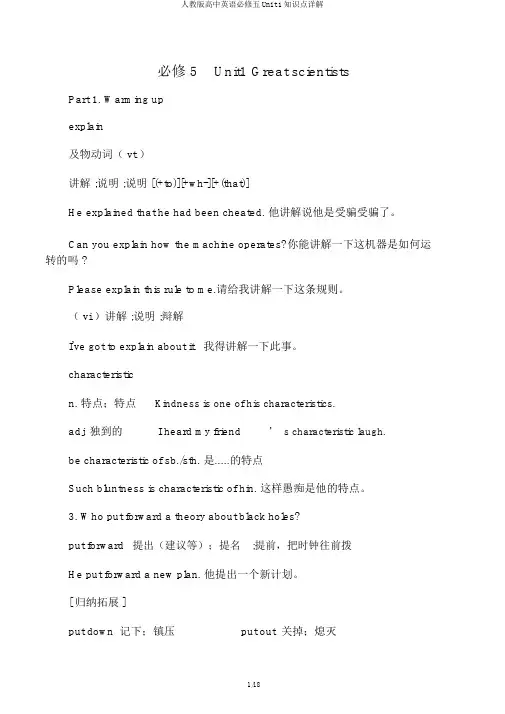
必修 5Unit1 Great scientistsPart 1. Warming upexplain及物动词( vt.)讲解 ;说明 ;说明 [(+to)][+wh-][+(that)]He explained that he had been cheated. 他讲解说他是受骗受骗了。
Can you explain how the machine operates?你能讲解一下这机器是如何运转的吗 ?Please explain this rule to me.请给我讲解一下这条规则。
( vi.)讲解 ;说明 ;辩解I've got to explain about it. 我得讲解一下此事。
characteristicn. 特点;特点Kindness is one of his characteristics.adj. 独到的I heard my friend’ s characteristic laugh.be characteristic of sb./sth. 是.....的特点Such bluntness is characteristic of hin. 这样愚痴是他的特点。
3. Who put forward a theory about black holes?put forward提出(建议等);提名;提前,把时钟往前拨He put forward a new plan. 他提出一个新计划。
[ 归纳拓展 ]put down 记下;镇压put out 关掉;熄灭put aside 放在一边;储蓄;保留put off 推迟;延期put up 建筑;举起;张贴put on 穿上put away 收好选词填空(put off, put up, put forward, put aside, put out )①The plan that you _____ at the meeting is wonderful.②Many tall buildings were _____ along the road.③Firefighters have been called to _____ the fire in the city center.④He has a little money to _____ for a rainy day.⑤Don’ t _____ until tomorrow what can be done today.1. Do you know how to prove a new idea in scientific researchhow to prove a new idea 为“疑问词 +不定式”结构,该结构可在句中作主语、宾语、表语等。
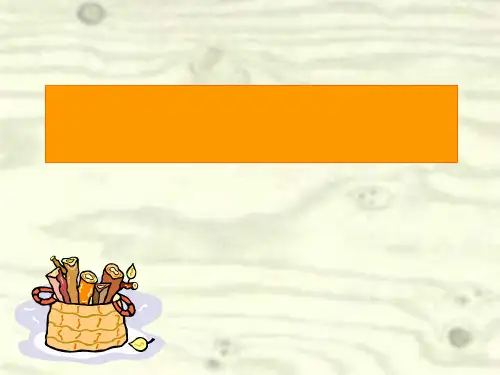
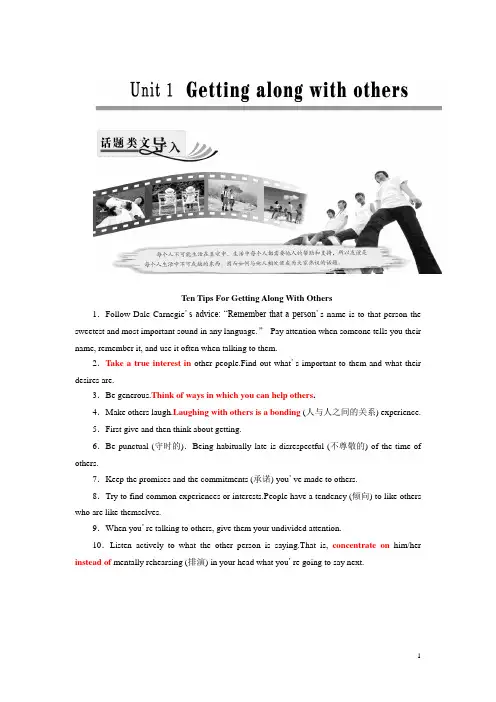
Ten Tips For Getting Along With Others1.Follow Dale Carnegie's advice: “Remember that a person's name is to that person the sweetest and most important sound in any language.”Pay attention when someone tells you their name, remember it, and use it often when talking to them.2.Take a true interest in other people.Find out what's important to them and what their desires are.3.Be generous.Think of ways in which you can help others.4.Make others ughing with others is a bonding(人与人之间的关系) experience.5.First give and then think about getting.6.Be punctual (守时的).Being habitually late is disrespectful (不尊敬的) of the time of others.7.Keep the promises and the commitments (承诺) you've made to others.8.Try to find common experiences or interests.People have a tendency (倾向) to like others who are like themselves.9.When you're talking to others, give them your undivided attention.10.Listen actively to what the other person is saying.That is, concentrate on him/herinstead of mentally rehearsing (排演) in your head what you're going to say next.Section ⅠWelcome to the unit & Reading — Pre-readingSecrets and liesDear AnnieI feel betrayed①by my friend Hannah.We have been best friends since primary②school and spend almost every day with each other.Sometimes, other children say we are no fun ③because④we are both very academic⑤and like to study, but we like it that way.We are both very hard-working and always get good grades at school.On Monday, we had a surprise⑥math quiz⑦.I thought it was quite easy and was not worried about the results.I must have sounded⑧very proud of myself after the quiz, saying how easy it was and how I was sure to get a good grade⑨.The next day after class, my math teacher told me that I had the lowest grade in the class! I felt so ashamed○10;I must be really stupid⑪to fail⑫a simple math quiz!①betray [bI'treI] v t.出卖,背叛②primary ['praIm(ə)rI] adj.初步的,初级的③fun n.[U]乐趣(其前不能加不定冠词)funny adj. 有趣的;滑稽的④because引导原因状语从句。
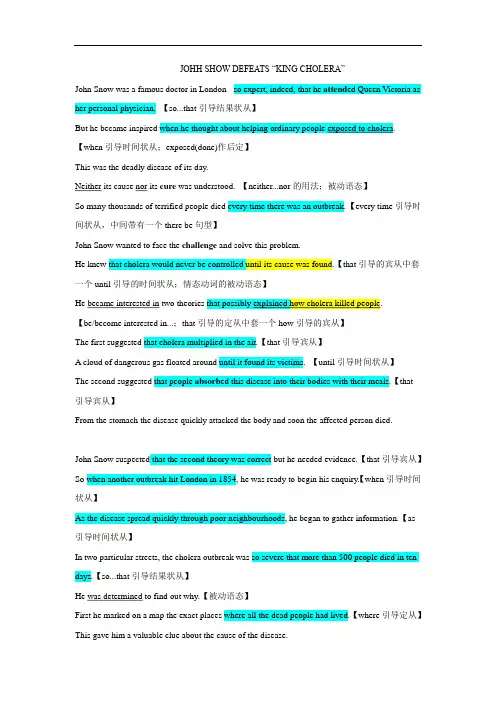
JOHH SHOW DEFEATS “KING CHOLERA”John Snow was a famous doctor in London - so expert, indeed, that he attend ed Queen Victoria as her personal physician. 【so...that引导结果状从】【when引导时间状从;exposed(done)作后定】This was the deadly disease of its day.Neither its cause nor its cure was understood. 【neither...nor的用法;被动语态】So many thousands of terrified people died every time there was an outbreak. 【every time引导时间状从,中间带有一个there be句型】John Snow wanted to face the challenge and solve this problem.He knew that cholera would never be controlled until its cause was found.【that引导的宾从中套一个until引导的时间状从;情态动词的被动语态】He became interested in two theories that possibly explained how cholera killed people.【be/become interested in...;that引导的定从中套一个how引导的宾从】The first suggested that cholera multiplied in the air.【that引导宾从】A cloud of dangerous gas floated around until it found its victims. 【until引导时间状从】The second suggested that people absorb ed this disease into their bodies with their meals.【that引导宾从】From the stomach the disease quickly attacked the body and soon the affected person died.John Snow suspected that the second theory was correct but he needed evidence.【that引导宾从】So when another outbreak hit London in 1854, he was ready to begin his enquiry.【when引导时间状从】As the disease spread quickly through poor neighbourhoods, he began to gather information.【as引导时间状从】In two particular streets, the cholera outbreak was so severe that more than 500 people died in ten days.【so...that引导结果状从】He was determined to find out why.【被动语态】First he marked on a map the exact places where all the dead people had lived.【where引导定从】This gave him a valuable clue about the cause of the disease.Many of the deaths were near the water pump in Broad Street (especially numbers 16, 37, 38 and 40).He also noticed that some houses (such as 20 and 21 Broad Street and 8 and 9 Cambridge Street) had had no deaths.【that引导宾从;had done过去完成时】He had not foreseen this, so he made further investigations.He discovered that these people worked in the pub at 7 Cambridge Street.【that引导宾从】They had been given free beer and so had not drunk the water from the pump.【过去完成时的被动;so和had间省略主语they】It seemed that the water was to blame.【that引导表从】Next, John Snow looked into the source of the water for these two streets.【that引导宾从;polluted作后定(高考中出现过)】He immediately told the astonished people in Broad Street to remove the handle from the pump so that it could not be used.【so that引导目的状从(是为了);情态动词的被动】Soon afterwards the disease slowed down.He had shown that cholera was spread by germs and not in a cloud of gas.【that引导宾从;被动语态】In another part of London, he found supporting evidence from two other deaths that were linked to the Broad Street outbreak.【that引导定从】A woman, who had moved away from Broad Street, liked the water from the pump so much that she had it delivered to her house every day.【who引导非限制定从;so...that引导结果状从】Both she and her daughter died of cholera after drinking the water.With this extra evidence John Snow was able to announce with certainty that polluted water carried the virus.【that引导宾从(没有直接跟在谓语动词之后)】To prevent this from happening again, John Snow suggested that the source of all the water supplies be examined.【that引导宾从】The water companies were instruct ed not to expose people to polluted water any more.Finally "King Cholera" was defeated.定向练习,举一反三一、单词和短语1.The medicine will cure you ______ your cough.2.The doctor devoted himself to finding the cure ______ the disease.3.Most shin cancers are _______ (cure) if _______ (treat) early.4.Many patients are not getting the medical ________ (treat) they need.5.She likes her job to be ______ challenge.6.The new discovery ________ (challenge) traditional beliefs in 1850.7.Reducing the gap between rich and poor is one of the _________ (challenge) the government faces.8.Try tennis, badminton or boring. In short, try anything _________ (challenge).pletely ________ (absorb) in her new novel, the young writer kept thinking and writing in her study for a dozen hours.10.His ability _______ (absorb) information was astonishing, but his concentration time was short.11.Those small companies have been absorbed ______ the large company.12.When something did interest me, I could become ______ (absorb).13.He left office after _________ (suspect) of theft.*14.They suspected him ______ giving false evidence.15.He is the first _________ (suspect) of giving away government secrets to the enemy.*16.She blamed him ______ the failure of their marriage.17.If you fail the exam, you will only have yourself ________ (blame).18.Which driver was _______ (blame) for the accident?19.They put the blame for the abortion of the project ______ us.20._______ (blame) for the broken vase, the boy hung his head.21.There’s _____ direct link between diet and heart disease.22.The police suspect that the two cases may _______ (link).23.The Channel Tunnel _______ (link) Britain with the European contient.24.They walked with their arms ______ (link).25.Always read the _________ (instruct) on the bottle thoroughly and take the right amount ofmedicine.26.He is the ________ (instruct) who taught me how to shi.st week, we _________ (instruct) by our clients that you owe them 300 dollars.28.He instructs us ______ making self-introduction.29.She arrived at 10 o’clock as _______ (instruct).30.All the evidence suggests that he _______ (steal) the money.31.Earlier reports suggested that a meeting _________ (take) place next Sunday.32.I suggest that you _______ (thought) over your position very carefully.33.I suggest _______ (add) vitamins E and A to your diet.34.He suggested that we _______ (hold) a meeting to discuss this problem.35.He suggested _______ (hold) a meeting to discuss this problem.36.The doctor advised my father _______ (give) up smoking.37.The volunteers contribute most of their own spare time ______ the project.38.The young population of a nation are the people ________ (contribute) most to a country’s economic development.39.Her ________ (contribute) to the reaserch were largely unacknowledged.二、语法专项1.后置定语(1)The adobe dwellings(土坯房) ______ (build) by the Pueblo Indians are admired by even the most modern architects. (2015年全国卷)(2)The airport _______ (complete) last year has helped promote tourism in this area.(3)There are hundreds of vistor _______ (wait) in front of the Art Gallery.COPERNICUS’ REVOLUTIONRRY THEORYNicolaus Copernicus was frightened and his mind was confused.Although he had tried to ignore them, all his mathematical calculations led to the same conclusion that the earth was not the centre of the solar system.【although引导让步状从;that引导同位从】Only if you put the sun there did the movements of the other planets in the sky make sense.【if引导条件状从;only放句首时,句子要用部分倒装(波浪线部分为主句谓语动词,did助动词置于主句主语之前)】【as引导原因状从;would have done虚拟语气】They believed God had made the world and for that reason the earth was special and must be the centre of the solar system.【省略that的宾从;for‘由于...’】The problem arose because astronomers had noticed that some planets in the sky seemed to stop, move backward and then go forward in a loop.【because引导原因状从;that引导宾从】Others appeared brighter at times and less bright at others.This was very strange if the earth was the centre of the solar system and all planets went round it.【if引导条件状从】Copernicus had thought long and hard about these problems and tried to find an answer.He had collected observations of the stars and used all his mathematical knowledge to explain them.But only his new theory could do that.So between 1510 and 1514 he worked on it, gradually improving his theory until he felt it was complete.【until引导时间状从】In 1514 he showed it privately to his friends.The changes he made to the old theory were revolutionary.【省略that/which的定从】He placed a fixed sun at the centre of the solar system with the planets going round it and only the moon still going round the earth.He also suggested that the earth was spinning as it went round the sun and this explained changes in the movement of the planets and in the brightness of the stars.【that引导宾从;as引导时间状从】His friends were enthusiastic and encouraged him to publish his ideas, but Copernicus was cautious.He did not want to be attacked by the Christian Church, so he only published it as he lay dying in 1543.【as引导时间状从】Certainly he was right to be careful. The Christian Church rejected his theory, saying it was against God's idea and people who supported it would be attacked.【who引导定从】Yet Copernicus' theory is now the basis on which all our ideas of the universe are built.【on which 引导定从】His theory replaced the Christian idea of gravity, which said things fell to earth because God created the earth as the centre of the universe.【which引导非限制定从中套一个because引导的原因状从】Copernicus showed this was obviously wrong.Now people can see that there is a direct link between his theory and the work of Isaac Newton, Albert Einstein and Stephen Hawking.【that引导宾从】。

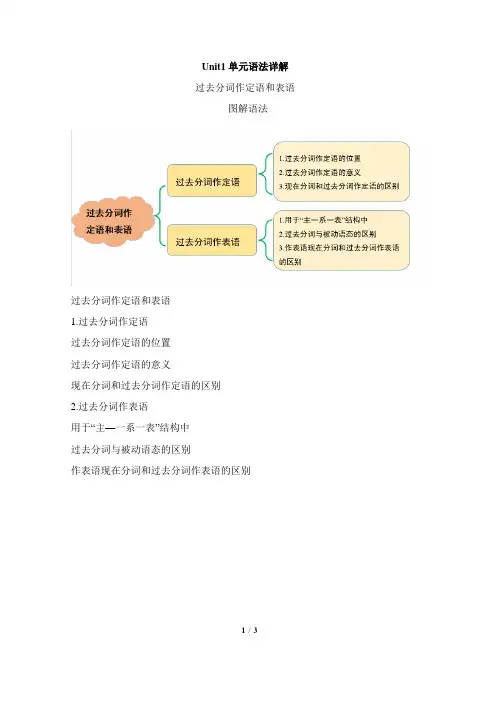
Unit1单元语法详解过去分词作定语和表语图解语法过去分词作定语和表语1.过去分词作定语过去分词作定语的位置过去分词作定语的意义现在分词和过去分词作定语的区别2.过去分词作表语用于“主—一系一表”结构中过去分词与被动语态的区别作表语现在分词和过去分词作表语的区别1/ 3归纳语法过去分词,也称动词的-ed形式,是一种非限定动词。
规则动词的-ed形式由动词原形词尾加-ed构成,也有不规则动词变化表。
动词的-ed形式只有一种形式,没有时态和语态的变化。
它在句子中可以充当定语、表语等成分。
一、过去分词作定语1.过去分词作定语时的意义过去分词作定语,强调被动或者完成。
The wind swept the fallen leaves.风刮走了落叶。
Her daughter brought up by me has begun to work.她由我带大的那个女儿已经开始工作了。
fallen leaves 落叶/falling leaves正在飘落的树叶2.过去分词作定语时的位置(1)单个的过去分词作定语,常放在所修饰的词的前面;过去分词短语作定语时,常放在所修饰的词之后,此时,它相当于定语从句。
He told me that this was the wounded soldier.他告诉我这就是那个受伤的士兵。
Don't use words, expressions or phrases known only to people with specific knowledge. 不要使用仅仅有特定知识的人才知晓的单词、词组或短语。
Near the window is a bookshelf filled with books (=which is filled with books).靠近窗户有一个装满书的书架。
2/ 3Most of the students invited to the garden party (=who were invited to the garden party)came from our school.大部分被邀请参加游园会的学生来自我们学校。
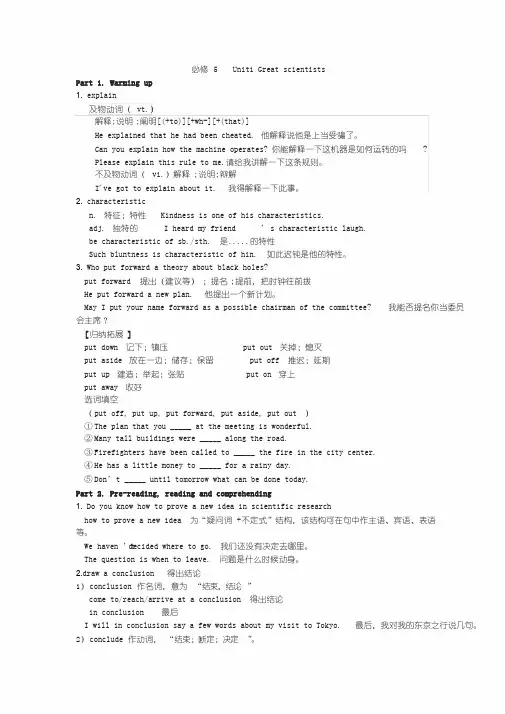
必修 5 Unit1 Great scientistsPart 1. Warming up1. explain及物动词(vt.)解释;说明;阐明[(+to)][+wh-][+(that)]He explained that he had been cheated. 他解释说他是上当受骗了。
Can you explain how the machine operates? 你能解释一下这机器是如何运转的吗?Please explain this rule to me.请给我讲解一下这条规则。
不及物动词(vi.)解释 ;说明;辩解I've got to explain about it. 我得解释一下此事。
2. characteristicn. 特征;特性Kindness is one of his characteristics.adj. 独特的I heard my friend ’s characteristic laugh.be characteristic of sb./sth. 是.....的特性Such bluntness is characteristic of hin. 如此迟钝是他的特性。
3. Who put forward a theory about black holes?put forward 提出(建议等);提名;提前,把时钟往前拨He put forward a new plan. 他提出一个新计划。
May I put your name forward as a possible chairman of the committee? 我能否提名你当委员会主席?[归纳拓展]put down 记下;镇压put out 关掉;熄灭put aside 放在一边;储存;保留put off 推迟;延期put up 建造;举起;张贴put on 穿上put away 收好选词填空(put off, put up, put forward, put aside, put out )①The plan that you _____ at the meeting is wonderful.②Many tall buildings were _____ along the road.③Firefighters have been called to _____ the fire in the city center.④He has a little money to _____ for a rainy day.⑤Don’t _____ until tomorrow what can be done today.Part 2. Pre-reading, reading and comprehending1. Do you know how to prove a new idea in scientific researchhow to prove a new idea 为“疑问词 +不定式”结构,该结构可在句中作主语、宾语、表语等。

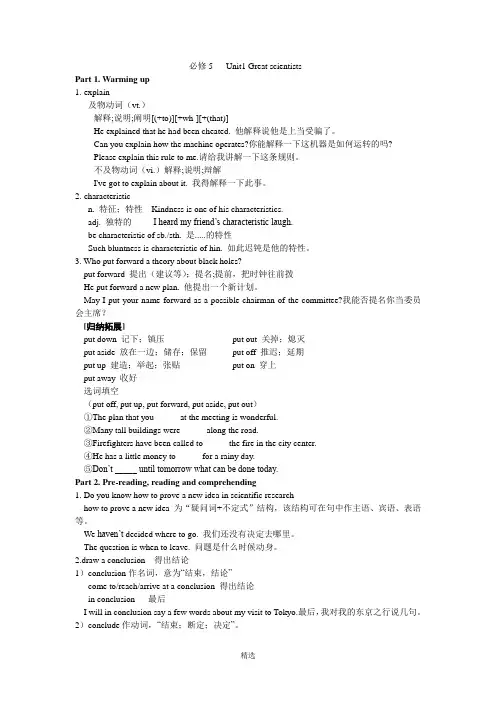
必修5 Unit1 Great scientistsPart 1. Warming up1.explain及物动词(vt.)解释;说明;阐明[(+to)][+wh-][+(that)]He explained that he had been cheated. 他解释说他是上当受骗了。
Can you explain how the machine operates?你能解释一下这机器是如何运转的吗?Please explain this rule to me.请给我讲解一下这条规则。
不及物动词(vi.)解释;说明;辩解I've got to explain about it. 我得解释一下此事。
2.characteristicn. 特征;特性Kindness is one of his characteristics.adj. 独特的I heard my friend’s characteristic laugh.be characteristic of sb./sth. 是.....的特性Such bluntness is characteristic of hin. 如此迟钝是他的特性。
3. Who put forward a theory about black holes?put forward 提出(建议等);提名;提前,把时钟往前拨He put forward a new plan. 他提出一个新计划。
May I put your name forward as a possible chairman of the committee?我能否提名你当委员会主席?[归纳拓展]put down 记下;镇压put out 关掉;熄灭put aside 放在一边;储存;保留put off 推迟;延期put up 建造;举起;张贴put on 穿上put away 收好选词填空(put off, put up, put forward, put aside, put out)①The plan that you _____ at the meeting is wonderful.②Many tall buildings were _____ along the road.③Firefighters have been called to _____ the fire in the city center.④He has a little money to _____ for a rainy day.⑤Don’t _____ until tomorrow what can be done today.Part 2. Pre-reading, reading and comprehending1. Do you know how to prove a new idea in scientific researchhow to prove a new idea 为“疑问词+不定式”结构,该结构可在句中作主语、宾语、表语等。
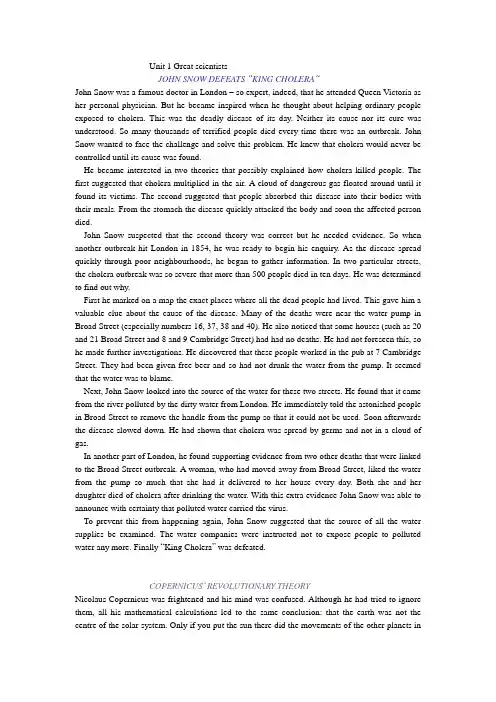
Unit 1 Great scientistsJOHN SNOW DEFEATS “KING CHOLERA”John Snow was a famous doctor in London – so expert, indeed, that he attended Queen Victoria as her personal physician. But he became inspired when he thought about helping ordinary people exposed to cholera. This was the deadly disease of its day. Neither its cause nor its cure was understood. So many thousands of terrified people died every time there was an outbreak. John Snow wanted to face the challenge and solve this problem. He knew that cholera would never be controlled until its cause was found.He became interested in two theories that possibly explained how cholera killed people. The first suggested that cholera multiplied in the air. A cloud of dangerous gas floated around until it found its victims. The second suggested that people absorbed this disease into their bodies with their meals. From the stomach the disease quickly attacked the body and soon the affected person died.John Snow suspected that the second theory was correct but he needed evidence. So when another outbreak hit London in 1854, he was ready to begin his enquiry. As the disease spread quickly through poor neighbourhoods, he began to gather information. In two particular streets, the cholera outbreak was so severe that more than 500 people died in ten days. He was determined to find out why.First he marked on a map the exact places where all the dead people had lived. This gave him a valuable clue about the cause of the disease. Many of the deaths were near the water pump in Broad Street (especially numbers 16, 37, 38 and 40). He also noticed that some houses (such as 20 and 21 Broad Street and 8 and 9 Cambridge Street) had had no deaths. He had not foreseen this, so he made further investigations. He discovered that these people worked in the pub at 7 Cambridge Street. They had been given free beer and so had not drunk the water from the pump. It seemed that the water was to blame.Next, John Snow looked into the source of the water for these two streets. He found that it came from the river polluted by the dirty water from London. He immediately told the astonished people in Broad Street to remove the handle from the pump so that it could not be used. Soon afterwards the disease slowed down. He had shown that cholera was spread by germs and not in a cloud of gas.In another part of London, he found supporting evidence from two other deaths that were linked to the Broad Street outbreak. A woman, who had moved away from Broad Street, liked the water from the pump so much that she had it delivered to her house every day. Both she and her daughter died of cholera after drinking the water. With this extra evidence John Snow was able to announce with certainty that polluted water carried the virus.To prevent this from happening again, John Snow suggested that the source of all the water supplies be examined. The water companies were instructed not to expose people to polluted water any more. Finally “King Cholera” was defeated.COPERNICUS’ REVOLUTIONARY THEORYNicolaus Copernicus was frightened and his mind was confused. Although he had tried to ignore them, all his mathematical calculations led to the same conclusion: that the earth was not the centre of the solar system. Only if you put the sun there did the movements of the other planets inthe sky make sense. Yet he could not tell anyone about his theory as the powerful Christian Church would have punished him for even suggesting such an idea. They believed God had made the world and for that reason the earth was special and must be the centre of the solar system.The problem arose because astronomers had noticed that some planets in the sky seemed to stop, move backward and then go forward in a loop. Others appeared brighter at times and less bright at others. This was very strange if the earth was the centre of the solar system and all planets went round it.Copernicus had thought long and hard about these problems and tried to find an answer. He had collected observations of the stars and used all his mathematical knowledge to explain them, but only his new theory could do that. So between 1510 and 1514 he worked on it, gradually improving his theory until he felt it was complete.In 1514 he showed it privately to his friends. The changes he made to the old theory were revolutionary. He placed a fixed sun at the centre of the solar system with the planets going round it and only the moon still going round the earth. He also suggested that the earth was spinning as it went round the sun and this explained changes in the movement of the planets and in the brightness of the stars. His friends were enthusiastic and encouraged him to publish his ideas, but Copernicus was cautious. He did not want to be attacked by the Christian Church, so he only published it as he lay dying in 1543.Certainly he was right to be careful. The Christian Church rejected his theory, saying it was against God’s idea and people who supported it would be attacked. Yet Copernicus’ theory is now the basis on which all our ideas of the universe are built. His theory replaced the Christian idea of gravity, which said things fell to earth because God created the earth as the centre of the universe. Copernicus showed this was obviously wrong. Now people can see that there is a direct link between his theory and the work of Isaac Newton, Albert Einstein and Stephen Hawking.。
U1John snow defeats “king cholera”约翰雪是伦敦的一位非常著名的医生,确实,他作为维多利亚女王的私人医生来照顾她,但是当他想到帮助暴露在霍乱王疾病下的普通人时,他变的很有灵感,在那时,这是一个致命的疾病,不论他的感染方式还是治愈方法都无从知晓,所以每次爆发的时候都有数以千计的惊恐的人丧生.约翰学想要面对这个挑战并且解决这个问题,他知道霍乱的起源如果无法找到,他将无法控制.他变的对可能解释霍乱如何杀人的两个学说感兴趣起来,第一个说明霍乱在空气中繁殖,一团危险的气体漂浮着直到找到他的感染者,第二个表明人们在吃饭时把疾病吸收入身体,从胃里,这病毒很快的攻击身体并且很快导致感染者死亡.约翰雪怀疑第二个学说是正确的但他需要证据,所以当其他的霍乱在1854年的伦敦爆发时,他已经完成了他询问的准备工作,当这个疾病很快传播到穷邻居时,他开始去收集信息,在两个特别的街道,霍乱的爆发特别严重以致于有五百多人在十天内死亡,他下定了找出原因的决心.的人的居住地邻近水泵.他也注意到了一些房子没有人死去,他没有对此深究,所以,他作了一个进一步的调查,他发现这些人们工作在剑桥七街的酒吧里,他们被给予了免费的啤酒所以不需要去喝水泵里的水,看起来,应该责备的是水.接下来,约翰雪调查这两条街的水的起源,他发现这水来自被伦敦来的污水污染过的河流,他立刻告诉宽街上惊恐的人们移开水泵的把手从而使他不能被使用,在这之后,很快这疾病就减缓了,他展示了霍乱是通过细菌来传播而不是一团气体.在伦敦的其他部分,他发现其他两个与宽街爆发有关的死亡病例来作为支持证据,一个从宽街搬走的女子,非常喜欢从那个水泵里打出的水,以致于每天她都让那水送到她家供他饮用,在喝过水后,她和她的女儿都死去了,用这个额外的证据,约翰雪有能力确定地宣布是被污染的水带来了病毒.为了阻止霍乱的再次发生,约翰雪建议所有的供水源头都应该被检查,卖水公司被命令不许再把人们暴露在污染的水之下,最终,”霍乱王”被击败了.第二单元人们可能会奇怪为什么用不同的词语来描述英格兰、威尔士、苏格兰和北爱尔兰这四个国家。
人教版高一英语必修五Unit1知识点详解必修5 Unit1 Great scientistsPart 1. Warming up1. explain 及物动词(vt.)解释;说明;阐明[(+to)][+wh-][+(that)]He explained that he had been cheated. 他解释说他是上当受骗了。
Can you explain how the machine operates?你能解释一下这机器是如何运转的吗?Please explain this rule to me.请给我讲解一下这条规则。
不及物动词(vi.)解释;说明;辩解I’ve got to explain about it. 我得解释一下此事。
2. characteristicn. 特征;特性Kindness is one of his characteristics.adj. 独特的I heard my friend’s characteristic laugh.be characteristic of sb./sth. 是.....的特性Such bluntness is characteristic of hin. 如此迟钝是他的特性。
3. Who put forward a theory about black holes?put forward 提出(建议等);提名;提前,把时钟往前拨He put forward a new plan. 他提出一个新计划。
May I put your name forward as a possible chairman of the committee?我能否提名你当委员会主席?[归纳拓展]put down 记下;镇压put out 关掉;熄灭put aside 放在一边;储存;保留put off 推迟;延期put up 建造;举起;张贴put on 穿上put away 收好选词填空(put off, put up, put forward, put aside, put out)①The plan that you _____ at the meeting is wonderful.②Many tall buildings were _____ along the road.③Firefighters have been called to _____ the fire in the city center.④He has a little money to _____ for a rainy day.⑤Don’t _____ until tomorrow what can be done today.Part 2. Pre-reading, reading and comprehending1. Do you know how to prove a new idea in scientific researchhow to prove a new idea 为“疑问词+不定式”结构,该结构可在句中作主语、宾语、表语等。
必修五Unit 1 Great Scie ntists 伟大的科学家I . Vocabularysteam engine 蒸汽机control vt.& n. 控制;支配apart from 除…之外;此外characteristic n. 特征;特性absorb vt. 吸收;使专心creative adj. 有创造力的;独创radium n.镭severe adj. 严重的;严厉的;严的put forward 提出格的;剧烈的co-operative adj. 合作的theory n 。
理论;学说valuable adj. 贵重的;有价值的positive adj. 积极的;肯定的infect vt. 传染;感染clue n. 线索;提示be strict with 对…严格的infectious adj. 传染的pump n.泵;抽水机revolutionary adj. 革命的cholera n. 霍舌L pub n.酒馆;酒吧calculation n. 计算;计算结果scientific adj. 科学的blame vt.责备;谴责;把…归咎于;lead to 通向;导致examine vt. 检查;诊察;考察n.过失;责备movement n。
移动;运动;动作conclude vt. & vi. 结束;结论;议immediately adv. 立即;马上make sense有意义定handle n.柄;把手;vt.处理backward adv. & adj.向后地conclusion n. 结论;结束;议定germ n.微生物;细菌(的);相反地(的);退步地(的)draw a conclusion 得出结论addition n. 加;增加;加法loop n.圈;环analyse vt. 分析in addition 也;另外complete adj. 完整的;完成的repeat vi & vt.重复;重做n. link vt. 连接;联系n.联系;环privately adv. 私下地;秘密地defeat vt. N.打败;战胜;使受link …to…将…和…连接或联系起spin vi. &vt.(使)旋转;纺(线)挫来brightness n. 明亮;亮度;聪颖attend vt.照顾;护理;出席;参announce vt. 宣布;通告enthusiastic adj. 热情的;热心加certainty n. 确知;确信;确实的expose vt.(与to连用)暴露;揭露;instruct vt. 命令;指示;教导cautious adj. 小心的;谨慎的使曝光virus n. 病毒reject vt. 拒绝;不接受;丢弃deadly adj.致命的construction n.建设;结构;建筑point of view 态度;观点;看法cure n. vt. 治愈;痊愈;治疗物logical adj.和逻辑的;合乎常理的n.爆发;发作(疾病或战争)II . Reading JOHN SNOW DEFEATS “ KING CHOLERAJoh n Snow was a well-k nown doctor in London —so famous,in deed, that he atte nded Quee n Victoria to ease the birth of herbabies.约翰斯诺在伦敦是一位著名的医生,的确,如此出名以致于由他护理维多利亚女王生孩子。
必修5 Unit1GreatscientistsPart1.Warmingup1.explain及物动词〔vt.〕解释;说明;说明[(+to)][+wh-][+(that)]Heexplainedthathehadbeencheated.他解释说他是上当受骗了。
Canyouexplainhowthemachineoperates?你能解释一下这机器是如何运转的吗? Pleaseexplainthisruletome.请给我讲解一下这条规那么。
不及物动词〔vi.〕解释;说明;辩白I'vegottoexplainaboutit. 我得解释一下此事。
characteristicn.特征;特性Kindnessisoneofhischaracteristics.adj.独特的Iheardmyfriend ’scharacteristiclaugh.becharacteristicofsb./sth. 是.....的特性Suchbluntnessischaracteristicofhin. 如此迟钝是他的特性。
3.Whoputforwardatheoryaboutblackholes?putforward 提出〔建议等〕;提名;提前,把时钟往前拨Heputforwardanewplan. 他提出一个新方案。
MayIputyournameforwardasapossiblechairmanofthecommittee?我能否提名你当委员会主席?[归纳拓展]putdown记下;镇压putaside放在一边;储存;保存putup建造;举起;张贴putaway收好putoutputoffputon关掉;熄灭推迟;延期穿上选词填空putoff,putup,putforward,putaside,putout〕①Theplanthatyou_____atthemeetingiswonderful.Manytallbuildingswere_____alongtheroad.Firefightershavebeencalledto_____thefireinthecitycenter.Hehasalittlemoneyto_____forarainyday.Don’t_____untiltomorrowwhatcanbedonetoday.Part2.Pre-reading,readingandcomprehending Doyouknowhowtoproveanewideainscientificresearchhowtoproveanewidea为“疑问词+不定式〞结构,该结构可在句中作主语、宾语、表语等。
高二英语必修五Unit 1课文翻译Unit 1 Great scientistsReadingJOHH SHOW DEFEATS “KING CHOLERA”约翰·斯洛击败“霍乱王John Snow was a famous doctor in London - so expert, indeed, that he attended Queen Victoria as her personal physician. But he became inspired when he thought about helping ordinary people exposed to cholera. This was the deadly disease of its day. Neither its cause nor its cure was understood. So many thousands of terrified people died every time there was an outbreak. John Snow wanted to face the challenge and solve this problem. He knew that cholera would never be controlled until its cause was found.约翰·斯洛是伦敦一位著名的医生——他的确医术精湛,因而成为照料维多利亚女王的私人医生。
但他一想到要帮助那些得了霍乱的普通百姓时,他就感到很振奋。
霍乱在当时是最致命的疾病,人们既不知道它的病源,也不了解它的治疗方法。
每次霍乱暴发时,就有大批惊恐的老百姓死去。
约翰·斯洛想面对这个挑战,解决这个问题。
他知道,在找到病源之前,霍乱疫情是无法控制的。
He became interested in two theories that possibly explained how cholera killed people. The first suggested that choleramultiplied in the air. A cloud of dangerous gas floated around until it found its victims. The second suggested that people absorbed this disease into their bodies with their meals. From the stomach the disease quickly attacked the body and soon the affected person died.斯洛对霍乱致人死地的两种推测都很感兴趣。
必修五Unit 1 Great Scientists 伟大的科学家steam engine 蒸汽机characteristic n.特征;特性radium n.镭put forward 提出theory n。
理论;学说infect vt.传染;感染infectious adj.传染的cholera n.霍乱scientific adj.科学的examine vt.检查;诊察;考察conclude vt. & vi.结束;结论;议定conclusion n.结论;结束;议定draw a conclusion得出结论analyse vt.分析repeat vi & vt.重复;重做n. defeat vt. N.打败;战胜;使受挫attend vt.照顾;护理;出席;参加expose vt.(与to连用)暴露;揭露;使曝光deadly adj.致命的cure n. vt.治愈;痊愈;治疗outbreak n.爆发;发作(疾病或战争)control vt.& n.控制;支配absorb vt.吸收;使专心severe adj.严重的;严厉的;严格的;剧烈的valuable adj.贵重的;有价值的clue n.线索;提示pump n.泵;抽水机pub n.酒馆;酒吧blame vt.责备;谴责;把…归咎于;n.过失;责备immediately adv.立即;马上handle n.柄;把手;vt.处理germ n.微生物;细菌addition n.加;增加;加法in addition也;另外link vt.连接;联系n.联系;环link…to…将…和…连接或联系起来announce vt.宣布;通告certainty n.确知;确信;确实instruct vt.命令;指示;教导virus n.病毒construction n.建设;结构;建筑物apart from 除…之外;此外creative adj.有创造力的;独创的co-operative adj.合作的positive adj.积极的;肯定的be strict with对…严格的revolutionary adj.革命的calculation n.计算;计算结果lead to通向;导致movement n。
移动;运动;动作make sense有意义backward adv. & adj.向后地(的);相反地(的);退步地(的)loop n.圈;环complete adj.完整的;完成的privately adv.私下地;秘密地spin vi. & vt.(使)旋转;纺(线)brightness n.明亮;亮度;聪颖enthusiastic adj.热情的;热心的cautious adj.小心的;谨慎的reject vt.拒绝;不接受;丢弃point of view态度;观点;看法logical adj.和逻辑的;合乎常理的John Snow was a well-known doctor in London —so famous, indeed,that he attended Queen Victoria to ease the birth of her babies.约翰斯诺在伦敦是一位着名的医生,的确,如此出名以致于由他护理维多利亚女王生孩子。
【注释:attendv.出席;到场;注意;照看attend to处理;注意倾听;专心于;照料;attend school/class/ church/ a wedding/ a meeting/ a lecture/ a movie; attend on/ upon sb.伺候某人;照顾某人;eg. 1) I’ll attend to the matter.我来处理此事。
2) He was very tired after the longrun, and expected someboday to attend on him.长袍之后他感到非常疲劳,很想有个人来照顾自己一下。
▲辨析:attend, join, join in, take part in(1) attend是正式用语,一般指参加会议、典礼、婚礼、葬礼及去听课、听报告等;(2)join指加入某党派、某组织、某社会团体以及参军等,如:He joined the football club two years ago. (3) join in通常指参加某种活动,尤其指其他人一起参加某项活动,如:I hope you’ll all join in the discussion. (4) take part in指参加群众性活动、会议、劳动、游行等,往往参加者持有积极地态度,并起到一定的作用,有时可与join in互换,如:Will you take part in the English evening 试题:——Who is ______ the patient ——Maybe his sister.A. taking careB. looking forC. joining inD. attending on】But he became inspired when he thought about helping ordinary people exposed to cholera.但当他想到要帮助受霍乱侵扰的普通民众,他就感到受到激励(或感受到神灵的召唤)。
【注释:①inspire(1)影响或触动:eg. The falling leaves inspired her with sadness.落叶触动了她的伤感. (2) 鼓励;激励eg. 1) inspire sb. with hope激起某人的希望2) I was inspired to work harder than ever before.我受激励比以往任何时候都更加努力地工作。
②expose to使易受;使受eg. exposed themselves to disease使他们受到疾病的影响;exposed their children to classical music. 使他们的孩子们受到古典音乐的影响。
考题:1. As we all know,women do not________their faces in public in some Middle Eastern countries.A.cover B.keep C.expose D.protect2.The more one is________the English-speaking environment,the better he or she will learn the language. A.exposed to B.filled in C.caught on D.kept up3.The reason why people carry umbrellas in hot summer days is that ____ to strong sunlight may be harmful to the skin.A.contributing B.exposing C.contributed D.being exposed 】This was the most deadly disease of its day. 这在当时是最为致命的疾病。
【注释:deadly adj. 致命的;死一般的;绝对的;完全的如:deadly weapons致命武器;a deadly pallor.死人般的苍白;deadly enemies.不共戴天的仇敌;:deadly concentration.绝对专心】Neither its cause, nor its cure was understood.其原因及治疗方法都不为人知道。
【注释:neither和相关连词nor 连用,连接并列主语(1)、并列谓语(2)、并列宾语(3)eg. (1)Neither we nor they want it. 我们和他们都不要它。
(2)She neither called nor wrote. 她既没打电话也没写信来。
(3)I got neither the gift nor the card.我既没得到礼物,也没得到贺卡。
考题:(2008辽) 1. Bill wasn’t happy about the delay of the report by Jason,and _____.A.I was neither B.neither was I C.I was either D.either was I2. If Joe’s wife won’t go to the party,________.A.he will either B.neither will he C.he neither will D.either he will 】So many thousands of terrified people died every time there was an outbreak.所以每当这种疾病爆发的时候,就有数以千计的感到恐惧的人死掉。
【注释:every time这是由名词词组充当连词,引导时间状语从句,类似这种用法的名词短语有:不定代词+time,如:any time; each time; 介词+time 如:by the time…;序数词+time,如:the first/last time…; the +瞬间名词,如:the minute, the moment, the instant “一…就…”;the +时间名词,如:the day, the night, the month, the time…eg. 1) She demands sweets from me every time/each time she sees me. 2) The truck will have arrived by the time you have all the things packed up. 3) The first time he did the experiment, he succeeded. 4) I’ll give him your message the minute/ the moment/ the instant he arrives.5) He bought a computer the day/ the time he got his salary. 考题:1. Don’t stop________you meet with a word you don’t understand.A.at the time B.each time C.by the time D.Sometimes2. ________you talk with someone or write a message,you show your skills to others.A.At times B.Some time C.Every time D.The time】John Snow wanted to use his knowledge to help solve this problem.约翰斯诺想用他的知识来帮助解决这个问题。